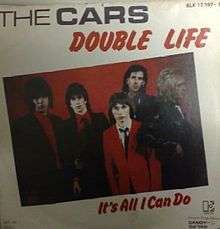Double Life (song)
| "Double Life" | ||||||||||||
|---|---|---|---|---|---|---|---|---|---|---|---|---|
 | ||||||||||||
| Single by The Cars | ||||||||||||
| from the album Candy-O | ||||||||||||
| B-side |
"Candy-O" (US) "Got a Lot on My Head" (UK) "It's All I Can Do" (Germany) | |||||||||||
| Released | December 11, 1979 | |||||||||||
| Format | 7" | |||||||||||
| Genre | New wave | |||||||||||
| Length | 3:35 | |||||||||||
| Label | Elektra | |||||||||||
| Writer(s) | Ric Ocasek | |||||||||||
| Producer(s) | Roy Thomas Baker | |||||||||||
| The Cars singles chronology | ||||||||||||
| ||||||||||||
| ||||||||||||
"Double Life" is a single by the American rock band The Cars from their second album Candy-O.
Background
On the Candy-O album, this song segues via cross-fading into the next song, "Shoo Be Doo", which, in turn, crosses from an uncharacteristic scream from Ric Ocasek, into the album's title track. Aside from being in the same relative keys (C major and A minor), the two have nothing in common. This trick of connecting multiple songs by crossfading or short segueways tempted radio programmers, in the earlier days of radio, into playing more than one song from the album. Many stations had succumbed to this temptation in the sequencing of Side Two of the band's debut album (in which "You're All I've Got Tonight", "Bye Bye Love", "Moving in Stereo", and "All Mixed Up" were all lined up seamlessly.) The first lines of the song, "It takes a fast car to lead a double life," are taken from the first two lines of a poem by Lawrence Ferlinghetti called "Lost Parents."[1]
A music video, featuring the band miming to the song, was also released. The video was the twenty-first music video to be aired on MTV.
Composition
The song is sung by Ric Ocasek on the lead vocals, while the other band members provide a harmony bed of "Aah"s and the repeating refrain "It's all gonna happen to you."
Although the song begins with an A power chord, the song is in C Major, consisting primarily of C and F major chords, A minor chords, and the dominant, G7 chords.
The song features a brief guitar solo by lead guitarist Elliot Easton, who plays a number of high-speed solo licks over a musical background of G major. Some of his solo phrases end pointedly on F, the dominant seventh of G, reinforcing its role as the dominant seventh chord.[2]
Reception
Allmusic reviewer Greg Prato states the song "embraces modern pop."[3]
Appearances
"Double Life" appears on the compilation, Just What I Needed: The Cars Anthology, and is around 12 seconds longer than the Candy-O version.[4]
References
- ↑ "A Geography of Poets" anthology edited by Edward Field, page 67
- ↑ The Cars/Candy-O sheet-music book, Lido Music, Inc., selling agent Warner Bros. Publications. ISBN VF0688
- ↑ Prato, Greg. Candy-O review. Allmusic.com.
- ↑ "Double Life" on Allmusic.com.